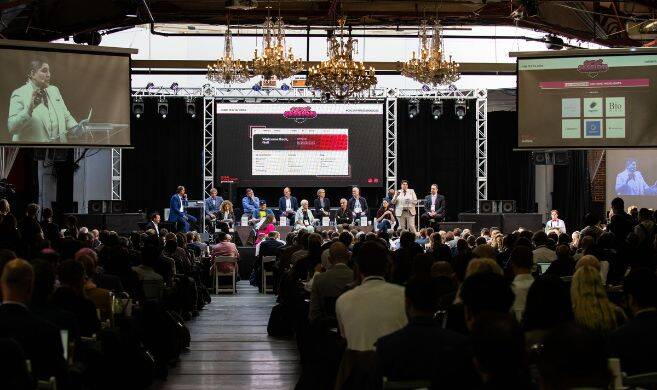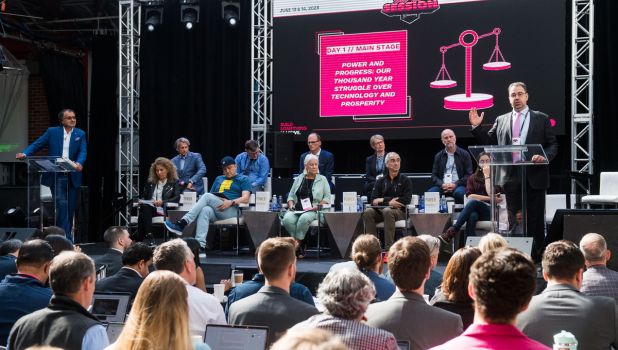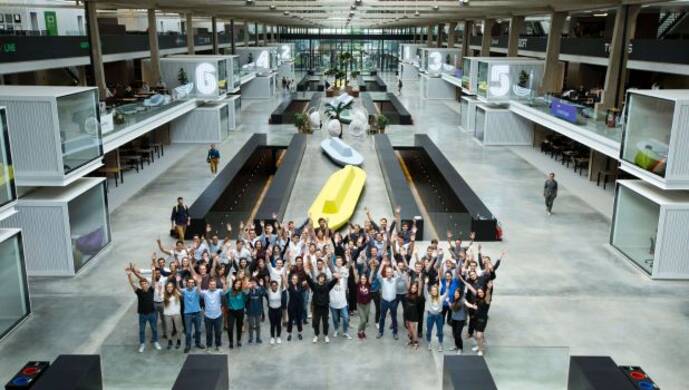listen to the podcast:
What an audacious leap of imagination to host the 2023 CDL Super Session on the edge of Lake Ontario, in a vast space initially built to house horticulture activities! Yet, 116 years after it first opened its doors, the Toronto Event Centre turned out to be an ideal setting for hundreds of triumphant startups to meet and flower after their grueling nine-month CDL program in 12 different sites. Under the 20-meter crystal dome, delegates from the 12 CDL global sites also followed high-quality debates. But mostly, they exchanged feverishly during and after the four sessions on their latest ventures, research and deeptech programs. These startups have been accompanied by a CDL program designed to sharpen objectives, raise capital and engage with expert mentors who work on the frontiers of research for the betterment of humankind. 675 companies in 24 different streams (some, like CDL Paris run two streams, soon to be three) began the adventure in October, just over a hundred were at the fifth and final session to graduate into the CDL family.
“This is a form of community building after a year in which the hundreds of technology- and science-based companies battled to the final stage of this program,” said Sebastian Becker, the HEC Academic lead (temporarily taking over from Thomas Astebro, on sabbatical leave). “It’s a rare opportunity for venture founders to meet investors and fellow-startuppers from the other sites. In a way, it’s supercharging the CDL method, allowing people to find investment, but also to discuss new technology and new solutions.”
11 years after founding the Creative Destruction Lab concept, Rotman School of Management Professor Ajay Agrawal did not hide his satisfaction at the results of the June 13&14 event: “This is a very special moment for three reasons. The first is that it’s been four long years since the COVID-19 pandemic deprived us of such in-person exchanges. Secondly we have doubled our number of sites, from six to 12 around the world, and that makes this meeting in Toronto very special. And lastly, CDL has had a long-standing commitment to working on Artificial Intelligence and, with the advent of ChatGPT last November, there’s been so much focus on this issue and such rapid advances in the last six months, it was primordial to debate its ramifications. These two days allowed us to dig deeply into both the technology and socio-economic implications and from the feedback I’m getting, I feel a lot of important conversations have been stimulated by this meeting.”
Daron Acemoglu Against the Rest?
None more so, arguably, than the opening debate on the Centre’s main stage pitting an economist hotly tipped for a future Nobel Prize in Economy and 11 mentors from the CDL network who questioned the former’s approach to AI. Indeed, economist Daron Acemoglu, has just co-authored "Power and Progress: The Social and Political Consequences of Technology," a 560-page book presenting the pros and cons of AI. During the entertaining exchange, Acemoglu cautioned against the misuse of AI whilst acknowledging its potential benefits. “I was delighted to be part of this conversation,” he said after the hourlong debate. “We didn’t agree with everything, but I thought the general perspectives were very constructive and positive – and that’s coming from an audience that normally leans more towards being optimistic about technology. I’m not a pessimist and I start from the premise that we are so much more fortunate, comfortable, healthier and prosperous because of technology today than we were 300 years ago. But that doesn’t mean that automatically things are going to be better because of AI.”
This was a discussion followed closely by Olivier Perquel, HEC Paris mentor and business angel. He made the cross-Atlantic journey to appraise the potency of new AI and deeptech startups as his former business school prepares to join the CDL AI stream in September. “The debate we had here is an embryonic version of the kind you see in Europe over the whole issue: does AI have some toxic components, should it be regulated, if so how extensively? These are important questions which were discussed with some depth here.” In summary, Perquel saw the discussions mirroring the ongoing debate in Europe about AI, including concerns about toxicity, regulation, and extensive governance. “This Super Session provided a platform for participants to explore these complex issues and work toward finding consensus. But, at the end of the day, they are very unlikely to reach such a consensus anytime soon,” he added with a smile.
At last year’s online Super Session, this 1987 HEC graduate himself discovered a startup devoted to cyber security and authentication and has since been advising and investing in their future. “These CDL programs are incredibly driven, and you feel this energy here,” underlined Perquel. “At the four initial sessions, everything is intense and carefully overseen by the professors and tutors involved. Each minute is counted as the startups are advised on how to prioritize resources and time, raise capital, hone their objectives for the session eight weeks later. At the Super Session here, there are different goals: the startups can cross-fertilize their projects because they meet mentors, experts and investors from the 23 other streams they would never meet otherwise.”
“A Complement to the University System”
What became clear over the two day Toronto event is how CDL serves as a bridge between academic researchers and entrepreneurs, fostering collaboration and bringing research discoveries into society. Professor Ajay Agrawal insisted it was a foundational stone for the dream he had when setting up the project over a decade ago: “The link between academic researchers, startup builders and investors is, in our view, paramount,” he said as the event closed. “It's the whole reason we designed CDL the way we did. Universities are beautiful, magical places, and at the same time they're very siloed. In some sense, that's what gives them their power. Because like-minded people who read the same literature and do the same type of research and have the same kind of vocabulary, can accelerate their work with each other because they have a common knowledge base.”
“But,” he continued, “that's both a blessing and a curse. It's a blessing because it accelerates the work in each discipline. And it's a curse because it sometimes focuses people on the wrong problems and because the most important challenges are cross disciplinary and also require the collaboration between research and business in order to bring the findings of research into society in a way which is beneficial. And so that is what we've aimed to do, to be a complement to the university system by bringing these people together. For the last two days, we've had 1,200 people and probably of those 1,200, about a third all on the science side and 2/3 are on the builder side and I would say of the builders, probably a third to half of the builders are themselves scientists as well.”
At the same, the Creative Destruction Lab involves MBA students who are invited both to observe and to contribute in the acceleration of the fledgling companies. HEC Academic lead Sebastian Becker not only teaches accounting and entrepreneurship, he himself tried to build a startup in his student days and remains deeply attached to the sector: “With this program, students have a live peek into the acceleration process of deeptech ventures that are all addressing global challenges. Normally, a student doesn’t access these sorts of processes. This space allows them sneak peeks into discussions over emerging deep technologies they could otherwise only experience much later.” There is another, more structural part of CDL which interests Becker and his academic colleagues: “A lot of our courses look at entrepreneurship examples of what we can call shallow tech, where you just develop a new marketplace. You don't really gauge on big technology. Your main muscle is marketing and growing fast, but you don't involve any deep technology. In CDL the ventures we accelerate are actually companies founded or in the process of being founded by scientists from the lab, people with a Ph.D, who have been pushing the edges of their fields for sometimes 5-10 years, inventing great new technologies that have the potential to be scalable and address global challenges, right? Understanding how this deep tech venture process works is really what CDL is about, and this translates as a great opportunity for our students.”
Looking Ahead
The discussions during the 2023 Super Session showcased a shift in mindset, with participants reevaluating the implications of technology and emphasizing the need for responsible innovation. It also served as a catalyst for knowledge sharing, relationship building, and the exploration of emerging technologies.
In conclusion, as CDL enters a new phase of growth and expansion, it remains committed to bridging the gap between academia, entrepreneurship, and investment. The CDL Super Session in Toronto exemplified the power of collaboration and the potential for groundbreaking breakthroughs in science and technology. For its part, CDL Paris will expand its engagement by introducing an AI/Machine Learningstream to its existing Climate and Space programs. Stay tuned for the inaugural session in October.









